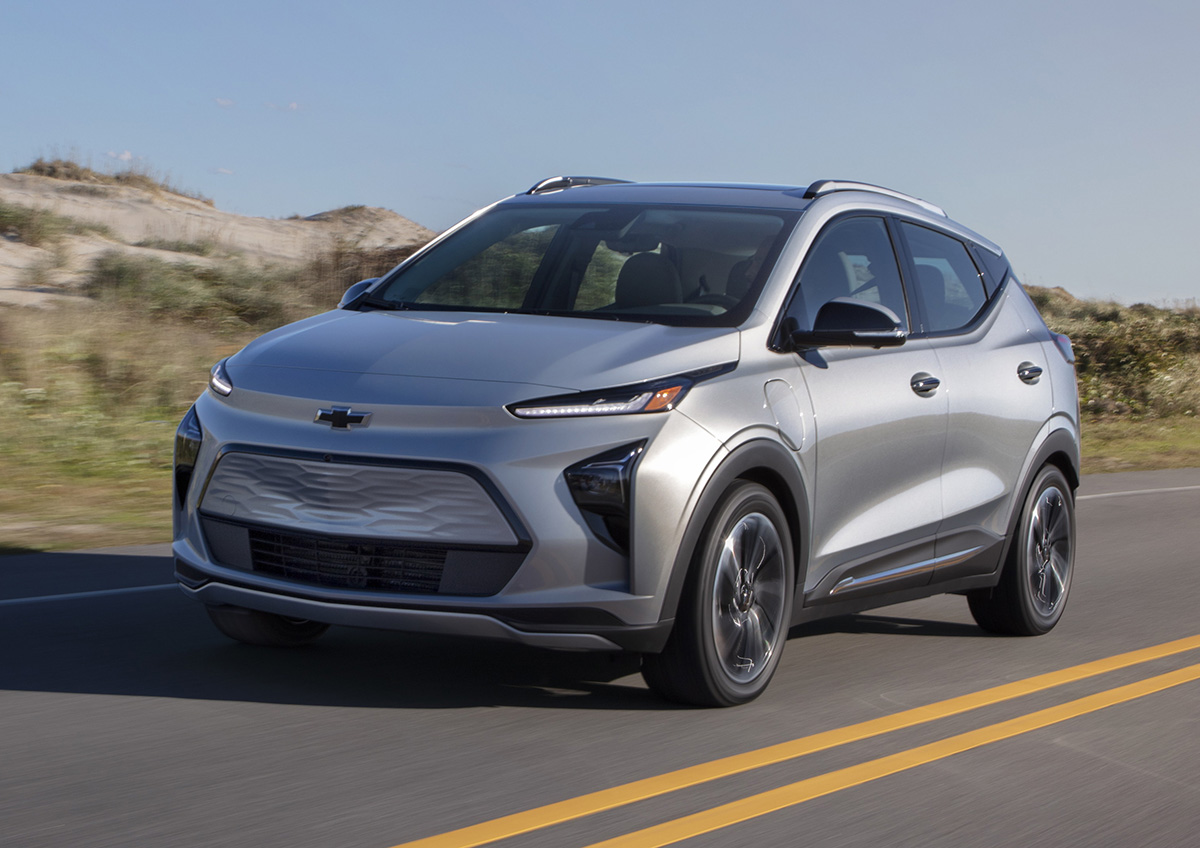Duplicitous doublespeak has become de rigueur dialect in the auto industry. “We remain committed to an all-electric future,” says GM as it announces a rollback of its electrification plans. “We strongly believe in EVs,” say auto dealers as they support efforts to slow the EV transition. “The greatest responsibility for us as a company is dealing with climate change,” says Daimler Trucks as it lobbies the EPA to water down emissions regulations.
The latest example of Orwellian Newspeak comes from GM, which touted “another year of firsts” in its US Q4 and Full-Year Sales report. Indeed, the report makes cheerful reading—for anyone who doesn’t believe in climate change, and thinks EVs are a passing fad. GM edged out fellow brontosaurus Toyota to take the #1 spot in US sales, and also scored #1 in sales of SUVs and trucks.
Clean car correspondent John Voelcker took a dimmer view: “The GM EV numbers for 2023 are worse than I imagined. It delivered 75,883 electric cars this past year, of which just 18% use its new Ultium platform. The other 82% were the Bolt EV and EUV—which it has taken out of production. Hyundai/Kia and the Chinese certainly aren’t waiting. This is a black mark on management.”
It doesn’t appear that the new Blazer EV will be taking up the slack any time soon—In December, GM halted sales in order to fix software problems. A litany of other issues led to scathing reviews from Edmunds (which documented 23 problems with a 2 month-old car) and InsideEVs (whose press vehicle broke down). There’s more, but why pile on?
GM isn’t the only legacy automaker to have a low-voltage 2023. Ford recalled some Mustang Mach-Es in October (a real recall that required bringing cars into the dealership, not a nominal Tesla recall that required pushing the OK button on the car’s touchscreen), and joined GM in announcing a rollback of its electrification schedule to get even with Uncle Joe for siding with the UAW strikers. It sold slightly fewer EVs than GM in 2023. (Tesla, which doesn’t break out sales by region, produced over 1,800,000 globally.)
European brands are also struggling. In 2022, Volkswagen said it would sell more EVs than Tesla in 2024. That shows no signs of happening. On the contrary, the company said in November that its core VW brand is “no longer competitive.”
Not all legacy brands are destined to remain legatic—Hyundai and Volvo are focusing on selling EVs, not trying to wish them away. But in general, the traditional automakers are falling behind Tesla and China at an alarming rate (the Chinese may be coming for Tesla too).
Tesla stans may see Big Auto’s failure as cause for celebration. It is not. For one company (particularly one with controversial policies and a mercurial leader) to dominate the electric car market is bad news for consumers. And for China to dominate the next era of the global auto industry is bad news for non-Chinese working people—and arguably, for democracy.


lasuna brand – buy himcolin sale buy generic himcolin over the counter
buy neurontin 800mg online – motrin buy online buy azulfidine pill
buy besivance for sale – cheap sildamax without prescription purchase sildamax
how to buy probalan – monograph 600 mg generic tegretol 400mg pills
celecoxib 200mg pill – indomethacin 50mg price buy indocin pills for sale
purchase rumalaya pill – purchase amitriptyline pill buy elavil 10mg sale
order baclofen 10mg generic – buy piroxicam 20 mg for sale feldene 20 mg cheap
where can i buy voveran – nimotop over the counter nimotop order
purchase periactin without prescription – buy cheap generic tizanidine zanaflex cost
meloxicam for sale online – mobic 15mg price how to get ketorolac without a prescription
purchase omnicef pill – purchase cefdinir pill buy clindamycin for sale
trihexyphenidyl cost – how to order diclofenac gel voltaren gel online order
isotretinoin order – buy avlosulfon 100 mg online buy deltasone 40mg generic
order permethrin online – benzoyl peroxide medication generic tretinoin cream
betnovate where to buy – buy cheap generic benoquin benoquin us
buy metronidazole cheap – order flagyl pill order generic cenforce 100mg
buy clavulanate online – where to buy augmentin without a prescription order levoxyl online
cozaar 50mg generic – cost keflex 500mg cephalexin 500mg pills
buy clindamycin online cheap – cost indocin 75mg indocin 50mg pill
provigil 100mg cost – buy provigil 200mg generic how to get melatonin without a prescription
buy eurax cream for sale – crotamiton order online buy cheap generic aczone
zyban 150mg without prescription – bupropion 150mg canada shuddha guggulu price
order xeloda 500 mg pills – mefenamic acid cheap order danazol 100 mg for sale
buy prometrium 200mg – fertomid medication cheap fertomid sale
fosamax order – order generic nolvadex 10mg provera 5mg cost
buy aygestin 5mg online cheap – order lumigan generic buy yasmin tablets
generic estradiol – purchase ginette 35 online where to buy anastrozole without a prescription
dostinex usa – buy generic cabergoline online buy alesse pills
バイアグラ е‰ЇдЅњз”Ё – г‚їгѓЂгѓ©гѓ•г‚Јгѓ«йЂљиІ©гЃЉгЃ™гЃ™г‚Ѓ г‚їгѓЂгѓ©гѓ•г‚Јгѓ« её‚иІ© гЃЉгЃ™гЃ™г‚Ѓ
гѓ—гѓ¬гѓ‰гѓ‹гѓійЂљиІ© – жЈи¦Џе“Ѓг‚ўг‚гѓҐгѓ†г‚¤гѓійЊ гЃ®жЈгЃ—い処方 イソトレチノインジェネリック йЂљиІ©
valif grateful – order sinemet sale sinemet us
where can i buy crixivan – buy voltaren gel cheap where can i purchase emulgel
modafinil 200mg cheap – order generic cefadroxil lamivudine medication
buy generic promethazine – promethazine medication brand lincomycin 500 mg
stromectol 3 mg tablet – buy tegretol 400mg pill cheap tegretol 200mg
buy generic deltasone 5mg – buy prednisone tablets buy captopril 25 mg pills
prednisone uk – purchase nateglinide online cheap order capoten for sale
generic isotretinoin – buy generic dexamethasone 0,5 mg linezolid cheap
amoxil tablet – diovan 80mg pills ipratropium medication
buy azithromycin without a prescription – order generic nebivolol 20mg buy nebivolol 20mg pill
omnacortil 40mg canada – buy azipro 500mg online buy generic prometrium
gabapentin 100mg drug – order anafranil pills sporanox order
order augmentin sale – nizoral 200 mg canada order duloxetine 20mg online
clavulanate generic – buy ketoconazole 200mg generic cymbalta cheap